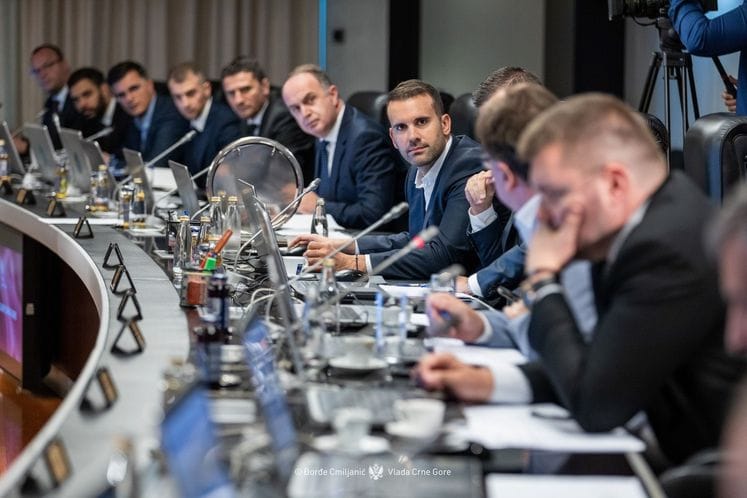- Government of Montenegro
Press release from the 47th Cabinet session
Press release from the 47th Cabinet session

The Montenegrin Cabinet held its 47th session today, chaired by Prime Minister Milojko Spajić. The Cabinet adopted the Fiscal Strategy for Montenegro for the period 2024-2027, along with a report on the public consultation process.
The Fiscal Strategy outlines Montenegro’s economic policy, strategic goals, and fiscal responsibility criteria, with the aim of ensuring a predictable and supportive fiscal policy. This approach is designed to enhance Montenegro's attractiveness as an investment destination, improve the business environment, and create new sources of economic growth, new jobs, and increase the pace of GDP per capita convergence with the EU average. The overarching fiscal policy goal for the 44th Government of Montenegro is to provide a stable and encouraging fiscal environment, which will be key in supporting Montenegro’s ambition to become a full EU member by 2028. The strategy also emphasizes the importance of aligning fiscal policies with EU regulations and criteria for responsible public finance management.
The Fiscal Strategy projects economic growth at an average annual rate of 3.7% over the period, with specific annual growth rates of: 3.8% in 2024, 4.8% in 2025, 3.1% in 2026, and 3.2% in 2027. Inflation is expected to gradually decrease, averaging 3% annually between 2025 and 2027, as pressures from price increases at the European level ease.
Budget revenues are forecasted to range from €2.772.6 million (38.1% of GDP) in 2024 to €3.081.2 million (35.8% of GDP) by 2027. This revenue stability will be maintained despite a reduction in labor tax burdens, through the implementation of new tax measures, enhanced competitiveness, and improved business conditions to attract investments.
On the other side, budget expenditures at the central government level are projected to range from €3.009.6 million (41.3% of GDP) in 2024 to €3.364 million (39.1% of GDP) in 2027. The fiscal policy focuses on managing public spending through: reforming the social protection system, ensuring funds are directed to those most in need; restructuring state-owned enterprises; optimizing the public administration by identifying areas for workforce rationalization and strengthening personnel where necessary, particularly in line with EU integration requirements; reforming the public sector wage system, and maintaining high levels of investment in capital projects.
Despite significant increases in certain public expenditure categories, the budget deficit is projected to reduce from 3.54% of GDP in 2025 to 3.3% in 2027. Importantly, the fiscal rule defined by the Law on Budget and Fiscal Responsibility will not be breached during this period, even though the government is giving up part of its revenues through tax reductions. It is noteworthy that the government will maintain a current budget surplus throughout the projection period, indicating that all current obligations will be financed from current revenues, and borrowing will be reserved solely for capital investments aimed at supporting the projected economic growth.
The Cabinet adopted the Draft Law of the Law on Consumer Credits, aimed at regulating consumer loan practices to ensure better protection for consumers and a more transparent loan market.
The Cabinet also made a decision to revoke the approval for the establishment of the free zone "New Tobacco Factory" in Podgorica, following the cessation of production and the sale of production lines, which resulted in employee layoffs. The government determined that the economic conditions for the zone's continued operation no longer exist, and it is no longer justified to maintain the free zone status.
The Cabinet adopted the second annex to the European Commission's 2024 Report on Montenegro, covering the period from 1 April to 1 September 2024. This annex is part of the regular reporting cycle to the European Commission on the country’s progress towards EU membership. The annex aligns with the structure of the Commission's last report on Montenegro from 2023 and adheres to the revised EU enlargement methodology, which clusters related negotiation chapters into six thematic areas. It provides a detailed account of progress in areas such as: political and economic criteria; public administration reforms, and the alignment of Montenegro's legal framework with the EU acquis across 33 negotiation chapters.
This annex serves as an important reference for the European Commission's annual assessment of Montenegro's EU accession progress and helps shape future recommendations.
The Cabinet also adopted information related to project applications prepared for submission under the 31st technical assistance call and the extended 10th co-financing call within the Western Balkans Investment Framework (WBIF). These projects focus on sustainable transport, clean energy, digitalization, environmental protection, climate change, and human resources development. The deadline for submitting project proposals is 6 September 2024.
The Ministry of Maritime Affairs submitted a project proposal titled "Preparation of studies and technical documentation for the environmental protection of various components in the Port of Bar." The project aims to deepen the sea floor, expand the passenger terminal, and improve the port's railway connection.
The Ministry of Transport submitted a project for the Mateševo-Andrijevica road section, with an estimated total value of €604.6 million. The project will enhance regional connectivity, reduce inequalities, and integrate Montenegro into the Trans-European transport network.
Additionally, the Cabinet approved preparatory works for the construction of the Veruša-Lopate road section, which will connect the Gusinje/Plav regional road with the Bar-Boljare highway.
For full press release in Montenegrin please click here.

